Ellen and Jim Have a Blog, Too
We are two part-time academics. Ellen teaches in the English department and Jim in the IT program at George Mason University.


Pallisers 8:15: The new Duke and Duchess, Marie Goesler and Phineas at risk (3) · 4 October 08
Dear Friends,
This is the last of my three blogs on this magnificent part. I am continuing a summary and concise analysis of the episodes of 8:15. The dominant theme is the replacement of the Duke by Plantagnet (Philip Latham) and Lady Glencora (Susan Hampshire) Palliser; the corollary is Marie Goesler’s (Barbara Murray) sense of herself as now all alone and her gifts left to waste, and Phineas’s (Donal McCann) as his position with his associates as tenuous, beset by slander (from envy and other people’s interests). Both see themselves at risk of ending up discarded as outsiders.
Throughout these last two episodes Raven milks the same set of pages over and over: Phineas Redux, Vol 1, Chs 25-26, pp. 217-228. (I am using a recent reprint of the 1983 Oxford paperback edition, introduced by F. Lyons.) Madame Max’s (Barbara Murray) refusal of the Duke’s (Roland Culver) jewels contrasts with Lizzie Eustace’s (Sarah Badel) clinging to them. Unlike Raven’s Lizzie and Lady Glen (Susan Hampshire), Madame Max is articulate and explains why. Then again when she refuses the jewels in the last scene, she reiterates how much they would cost her for what is worthwhile in life: relationships. Lizzie is the hollow woman who has nothing in her to give. I thought this beautiful and really the best in Trollope’s own Madame Max too.
The reasoning why she would have lost all other relationships is more pragmatic and cynical, the same she gives the Duke for not agreeing to be his mistress or wife. Were she to have taken the Duke as his wife, they would have lost their connection with the family; she would not have been welcome she says among the Plantagenets (Lady Glen would not have been a friend); so the family system trumps sex.
Barbara Murray’s looks in her eyes says much: sad, mostly rueful, the sublimation of which Freud speaks is here, but also a woman’s point of view: Marie has maintained her independence and self-respect this way: she is self-contained and not owned or subject to anyone. This is an important theme in 6:11: Sex, babies and pressure: it was there clear Madame Max was glad she was not, nor likely to be, pregnant, unlike Lady Glen who was subject to Plantagenet (Philip Latham). In one scene in this episode Lady Glen suggests Lady Laura (Anna Massey) may have been Phineas’s mistress; as in the novel Madame Max is reluctant to acknowledge this, so there is an anxiety over Phineas’s sexual desires. Explicitly Madame Max says all she cares about is how Lady Laura’s case affects Phineas’s (Donal McCann) position and career. Marie sees the world as a man’s woman (the tamed superfemale again), even if supported by the friendship of a woman, Lady Glen, and her own income (from a dead husband).
Episode 34: “Tearful Goodbye:” Scene 11) Matching Priory, the front room, Pallisers turns from the familiar windows. He and Lady Glen are sincerely sorrowful we are to believe. The films have provided enough scenes between Lady Glen and the Duke to make us feel they have been congenial, become friends, and she now values the Duke despite his having instigated her aunts into forcing her to marry against her will.
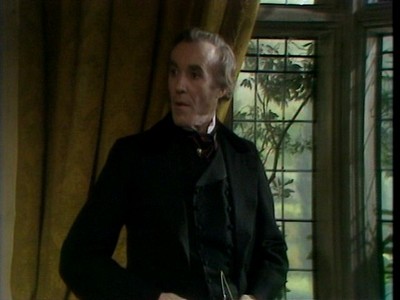
Palliser turns as Lady Glencora comes in.
How is the Duke, is the question. The doctor (Sir Omicron Pie) says not long now, half-stutters Lady Glen.
Again Palliser takes the role of the wise master of the situation: he says their sons must return from school to see their grandfather and their daughter come to see the old man die too; Lady Glen strongly reluctant but (natch) sees his wisdom. Sexual stereotyping here. She has sent to London for Marie.
Scene 12): Matching Priory, the Duke’s bedroom. Madame Max ladling soup (specially from pp. 218-224). Marie and the Duke speak of Lady Hartletop (the theme of one person’s refusal to honor the memories of another) whom the Duke refused to see. Marie’s comment that perhaps Lady Hartletop didn’t want the duke’s jewels leads to him talking about her and feeling touched to think she loved him. He wants to know if she did, why didn’t she come with him to Como or marry him.
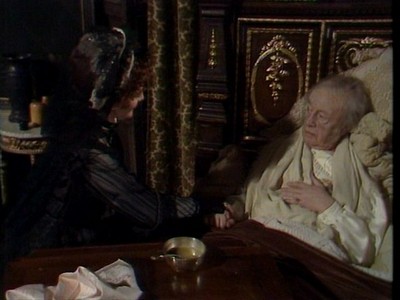
Duke and Marie
Lines are taken straight over and elaborated from Trollope. In both they agree they have been “dear friends” and when he offers to marry her even now, she says “Such things will never be done by me, your grace.”
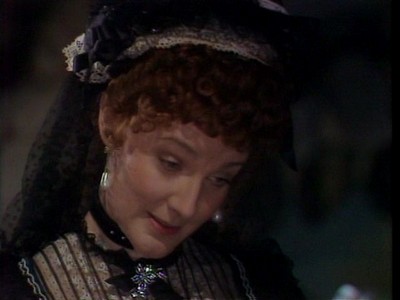
Marie looks down
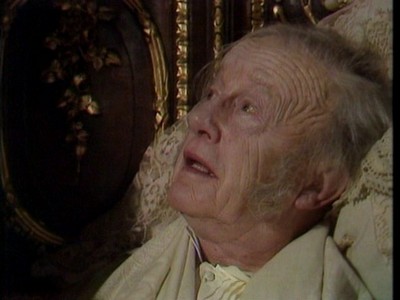
The Duke looks up
It’s daring to present such an aged man as a lover and make him someone we are to sympathize with. Rarely done.
The Duke frets when he thinks of Trumpeton Wood and Lord Chiltern (church bells are heard and Marie says “you mustn’t worry about such things”), and then Raven changes Trollope’s lines showing a man stoically facing death. Raven anticipates Brideshead Revisited but in reverse. In Mortimer’s film and Waugh’s book, Lord Marchmain takes the last sacrament and it’s meant to be a sign he believes and religion is true; in Trollope there is trust in what will happen hereafter, and he takes the sacrament as he does the broth from the aging hired nurse. Trollope writes:
“He knew that he had lived, and that the thing was done. His courage never failed him. As to the future, he neither feared much nor hoped much; but was, unconsciously, supported by a general trust in the goodness and the greatness of God who had made him what he was. ‘It is nearly done now, Marie,’ he said to Madame Goesler one evening. She pressed his hand in answer.”
Trollope is also bothered by the man having been so powerful and rich:
‘His condition was too well understood between them to allow of speaking to him of any possible recovery. ‘It has been a great comfort to me that I have known you,’ he said.
‘Oh no!’
‘A great comfort;—-’Only I wish it had been sooner. I have talked to you about things which I never did talk to anyone. I wonder why I should have been a duke, and another man a servant.’
‘God Almighty ordained such difference.’
‘I’m afraid I have not done it well;—but I have tried, indeed I have tried: Then she told him he had ever live as a great nobleman ought to live. And, after a fashion, herself believed what she was saying. Nevertheless, her nature was much nobler than his; and she knew that no man should dare to live idly as the Duke had lived (Vol 1, Ch 26, ‘I would do it now,’ p. 226)
The sense here is perhaps that God will punish such a man?
By contrast Raven drops the worry over rank, and turns the dialogue into someone who is not thinking there is any hereafter, someone who denies any magical or sacrament nature of rituals, but seeks what comfort he can get from the here and now; Marie makes no such endorsement of his behavior. This may seem paradoxical since Raven makes her state clearly that she loves the Duke several times in an unqualified manner she does not in the book, but I suppose some sentimentality is required to create the kind of emotionalism that will go over with a wider audience.
Duke: “Yes it is nearly finished, Marie. ... [Glencora] sees to everything. Did you know she had a clergyman here to give me the sacrament? I took it of course to oblige her. [Chuckles.] But it meant no more to me than that spoonful of broth, not half as much because the broth comes from you.”
Marie: “Hush Duke.”
Duke: (Shakes his head at her) “Yes it’s nearly nearly finished, Marie. The thing is done. No. I hope for nothing, fear for nothing either. (Eyes wide open, he belches and dies.)
Marie: “Duke. (She gets up and leans over him). My lord Duke.
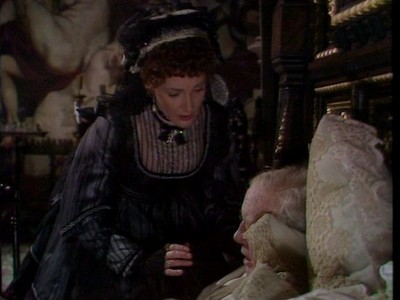
Marie recognizes he is dead.
(She walks to the front of the bed, curtsies). “You hope for nothing and you fear for nothing, but Duke of Omnium no man should dare to live as idly as you have done.”
Dissolve as we look at Duke in bed. Since she has been given a strong liberal progressive set of political beliefs, this may be intended to be a rebuke of his worldly conduct; on the other hand, it’s a sop to an audience who would like to read the line with the religious resonance Trollope may have intended. In modern books, say Graham Swift’s, the counter assertion is “the main thing is not to take it [life and what happens then] as a punishment” with no sense of hereafter.
Scene 12) Matching Priory, Outside church. The funeral. Raven is taking about 6 to 7 pages from Vol 1, Chs 25 -26, pp. 220-227, to supply all these central climactic series of scenes in 8:15. In Phineas Redux they are not climactic and there is no funeral. Raven wants to emphasize the Duke’s death as a turning point in his series: the visuals take us to the church where the coerced match took place, where the first baptism of the son was framed, and where we will see Lady Glen buried.
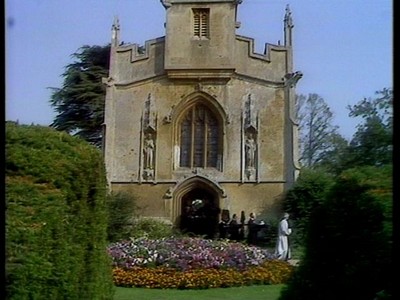
As in 1:2, Raven gives us a long piece of the ritual speech of the priest.
The mise-en-scene insists on our mortality as they will for the funeral of the Duchess in 12:26
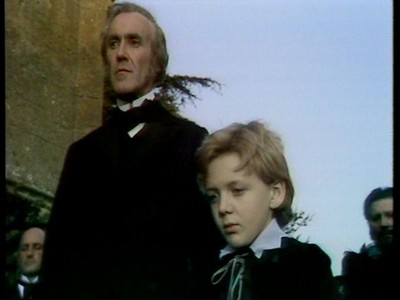
Silverbridge brought forward with his father (the pair who, much older, will dominate 12:26)
We also see Bungay (Roger Livesey) as we will for the Duchess, looking old; in the later scene he looks bereft. The custom in Victorian times was for women not to go to the grave. So no women here—though Lady Mary grown up and Marie will be there at the Duchess’s funeral.
Scene 13) Matching Priory, front room. Night. This is the first of a series of moving scenes between Plantagenet now Duke and Lady Glen now Duchess across the rest of the series. In each they come together to acknowledge the shared burden of life while at the same time showing us and one another how they differ in some of their fundamental responses to it. This is beautifully shot in the half-dark and sensitively acted. As in the case of several of these, there is no equivalent in Trollope. Trollope does not have an idea of marriage between these two as genuinely companionate (perhaps his was not, and he lived in an earlier era), Raven knows this is our ideal and delivers a scene we can find pleasure in
Duchess: “I suppose you must give up the Exechequer.”
Duke: “The one post a peer cannot hold. A Duke may hold any other office under the crown. He may be Prime Minister even. This one thing he cannot have. Auh! The Chancellor of the Exchequer sits in the Commons. All are agreed on this. (Brisk suddenly). They’re quite right.”
Duchess: “Yes, ‘tis very hard. You’ve been given what most men would sell their souls for and it means nothing to you.”
Duke: “Glencora I did not say that. It is God’s will that I must strive to do my duty in this new estate … (hoarse tone) well, Cora, will it please ya to be a duchess?
Duchess shakes her head …”
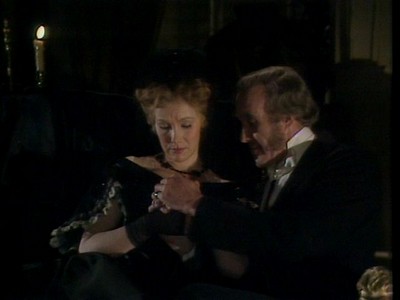
Companionate marriage
The viewer may be forgiven for thinking the Duchess is pleased, and time will show that being Duke means a great deal to Palliser. In scene 18 we will see her bitter regret that she is not left the old Duke’s jewels, and Palliser’s pleasure that Madame Max defers to him while refusing to take her legacy and jewels. Collingwood comes in with a letter about the will, and it’s here the Duchess answers the Duke she will not be giving up her friendship with Marie and he approves.
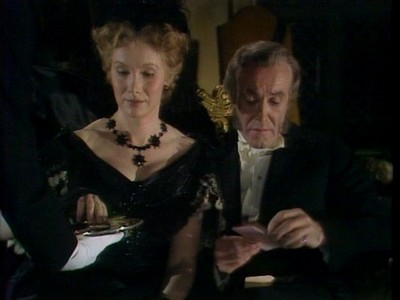
Diurnal detail of their comfort with the servant’s presence
Duke: “Do you intend to see as much of Madame Goesler. I mean that now that the … he uh … ”
Duchess: “Now that he is gone?” (camera on her but in dark). “Yes … Yes I do. Do you object?”
Duke: (feelingly, full voice, smile) “No … no. She’s a woman of some quality I think. Well, at first I wasn’t quite sure that that quality would harmonize with yours.”
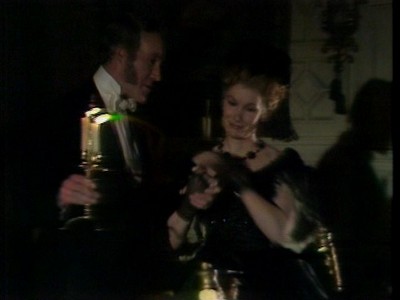
Duchess: “Well when two women understand each other as thoroughly as we do, we can either feel love or contempt. We’ve chosen the better way.
They face one another.
Duke: “Well then I leave for London tomorrow .. I shall be back in about four days.”
Duchess: ”(smiles tenderly with a gesture of her hand to his body). “Yes … your grace” (whispered).
Raven emphasizes the friendship of Marie and Lady Glen; in Trollope we are given Marie’s doubtful thoughts and expectation to be thrown over and then the continual invitations go on. Raven gives us a hostile take on womens’ natures. In Trollope we are implicitly left to remember that women do want supportive friendships implicitly.
Episode 35: “Marie’s Yearning:” Scenes 14/15) Phineas at his club alternates with Lady Laura receiving his letter in Dresden. Here Raven follows Trollope’s use of letters as the way to convey the story of Phineas and Laura in the middle part of this novel; there is an inset epistolary novel between them (so to speak).
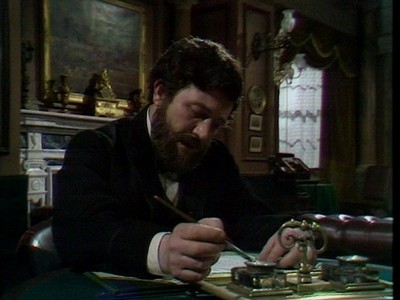
Phineas writing to Laura
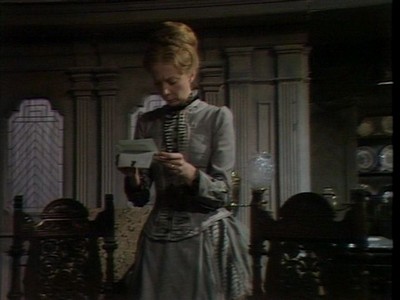
Laura reading Phineas’s letter
Phineas tells her he has succeeded in stopping the publication of Slide’s letter and Slide “will be angry but I do not think there is anything he can do.” Voice-over of McCann continuous throughout, with closer and closer close-ups of Massey. Epistolarity montage brief but effective.
Scene 16) Matching Priory, before the windows. Upstairs the Duchess and Marie watch the two boys, Silverbridge (very determined) and Gerald (Nicholas Scrivner, Andrew Tinney), playing ball, tackling one another. In 3:6 Lady Glen and Alice Vavasour had stood here watching the men in the garden forming and reforming political groups, also Phineas (when young) pass by the Duke and Madame Max; Lady Glen and Alice (Caroline Mortimer) stayed upstairs with Silverbridge as baby and Palliser came to them with the news he could be Chancellor of the Exechequer after all (an episode towards the end of the CYFH? matter).
Raven is still milking Vol 1, Chapters 26-27, now pp. 228-33, where Trollope makes Marie more sceptical of what the Duchess will now do: “If there had been hypocrisy in her friendship [for the Duke, for Lady Glen], the hypocrisy must be maintained to the end.” Trollope’s Duchess is better than this (as is Raven’s). Trollope’s Marie is harder; neither male envisages any role in the world that’s meaningful for a woman beyond that of man’s companion. Some of the blockings are modelled on Millais’s illustrations for Mary Lady Mason and Mrs Orme in Orley Farm.
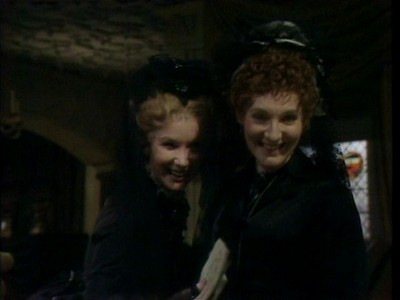
Duchess and Marie watch Duchess’s sons outside window
In this scene (as in Trollope) the Duchess presents herself as having to take care of the new Duke, speaks of his disappointments, and says she doesn’t care about the pearls. Raven takes this line from Trollope and makes it the end of his scene: “They could all have been yours, my dear, if you consented to be Mrs O.” Marie’s “Oh!” dismisses this as a foolish idea. It ends on them (and us) watching the boys out the window.
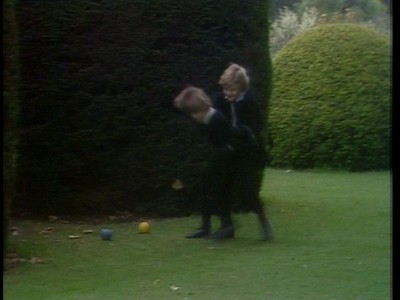
Silverbridge and Gerald tackling one another
The scene is there to reinforce this friendship for us, insist on the coming new generation (which doesn’t get the slightest look in except for the barest mentions in The Prime Minister until The Duke’s Children in Trollope) and show the women getting older.
Scene 17) Just outside Parliament chambers. Another aggressive confrontation between Slide and Phineas. As with the Matching Priory windows, so this chamber provided significant scenes for the ending of 4:8, a part for the Phineas Finn matter, and these were between Slide and Phineas. (Another part, 4:7 ended with Mr Clarkson (Sidney Bromley) harassing over Laurence Fitzgibbon’s debt in his lodgings.)
This is taken from Vol 1, Chapter 17, pp. 239-41. Slide, sizzling with anger, threatens Phineas. He will destroy Phineas’s reputation; in Trollope’s PR there are two chapters with the words “thunderbolt” for what Slide publishes.
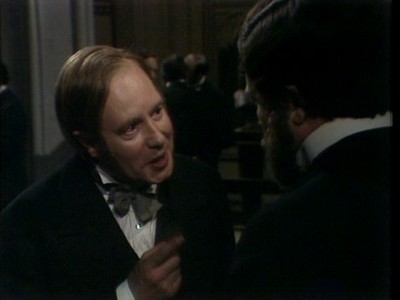
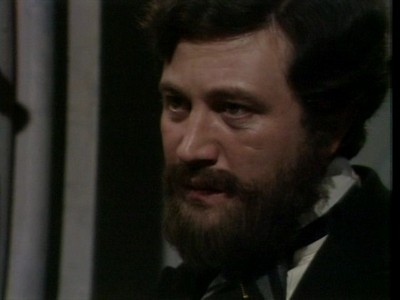
Phineas desperate, cornered, aging cracked face
These publications create an atmosphere in which Phineas cannot get office, feels desperate, and is distrusted. Again he sees his supposed colleagues walking by him (Palliser, Bonteen, Erle) from whom he is cut off. He walks off but knows he is trapped and made into someone ostracized:
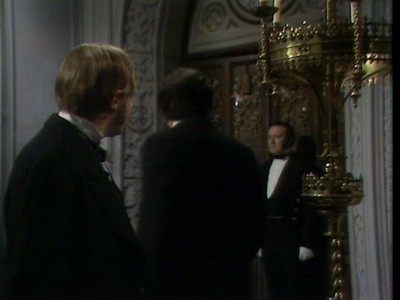
Hunched over, Phineas turns and walks away
Scene 18) Matching Priory, in front of the windows again. Again Chapters 26 and 27, this time where Marie refuses to take the jewels; in Trollope this scene is just between the Duchess and Marie, while here Palliser is brought in. Also the deep ruminations by Marie when she returns to London in the book, Chapter 30, “Regrets,” pp. 264-67.
In Trollope the yearning for love (from Phineas) is kept implicit as Trollope’s Marie is ashamed to admit this to herself; rather she tells herself she wants to be useful (what she said in the garden in the part for Phineas Finn where she first proposes to Finn); the emphasis in Trollope is a sense of regret over what she has been giving her life up to, in effect faute de mieux. What else had she to do but nurse the Duke? This is Trollope’s lack of imagination we might say for women did act in the public world and had interests beyond love and men (and children). Neither male author can envisage any meaningful life for a woman other than as a man’s companion.
Raven does show how (paradoxically one might say) womens’ friendship fills out the otherwise long stretches of not-so-empty time after all. There are three phases to Raven’s scene, first the Duchess and Duke where he tells her the Duke has left Madame Max 20,000 pounds and all his jewels:
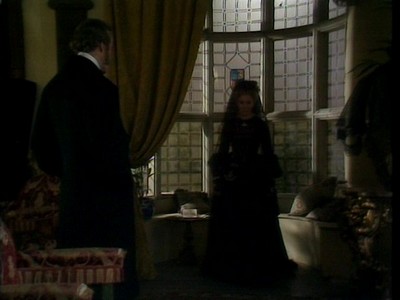
The Duke tells the Duchess about the will
She cannot resist saying how she regrets this loss; then we have the Duke, Duchess and Madame Max returned from her walk, Marie at first projecting innocent delight in the retreat of this beautiful park,
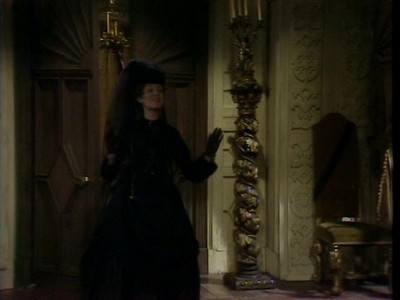
Marie in from walk telling Duke and Duchess how pleasant it was
but then upon Lady Glen’s greeting, Marie senses trouble:
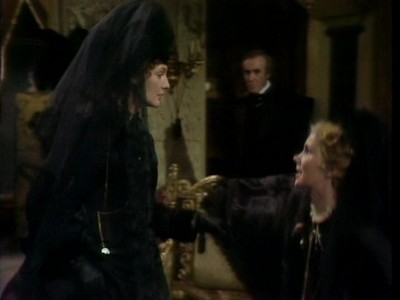
The Duchess is all generosity and magnanimity as she advises Marie who to go to: “You’d better send for Garen’s people, they understand these things best”—referring to packing. It’s a striking contrast to the stupidity in the way Lizzie Eustace flaunted and carried hers about.) Marie is startled, but quickly refuses; the scene is improved by having Palliser there as outsider, for he approves (cf. Chapter 26, pp. 230-32) of Marie’s behavior without any sense of irony.
The second phase begins as the Duke goes to leave, and Marie (with a gesture), prompts the Duchess to ask the Duke about Phineas, whereupon they are told about the violent encounter of Phineas and Kennedy. Marie witnesses the Duke’s disapproval (“Oh! ... the Duke of St Bungay … oh he told me some tale … I fear that both of them have been less than prudent”).
And then the third phase comes: the Duchess and Marie are again alone. We see how careful Marie knows she must be, and it’s this sense of her precarious position that partly causes her to refuse the money and jewels.
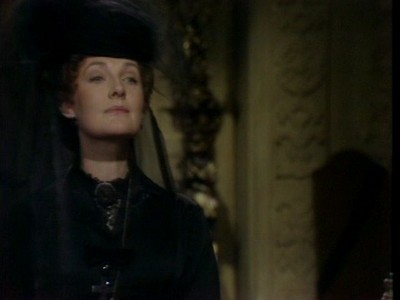
We witness Marie’s anxiety about Phineas’s reputation and moving speech about her loneliness. The effect is a complete transformation of Trollope’s chapter, “Regrets,” where Trollope’s context is Marie’s doubt the Duchess will stay true, and the coming of the drone, Maule, to ask her to marry him (Maule wants her money), before Phineas arrives for one of his visits of friendship. Phineas sees her emotional support and advice. So the feel in Trollope is sceptical & ironic rather than yearning.
The Duchess cannot believe Marie means not to have the jewels and money at first:
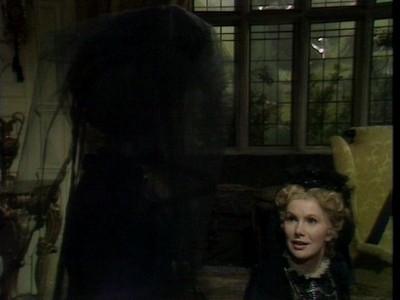
The Duchess disbelieves
Marie: “You have just heard me return it (wry look).
Duchess: “But you can’t mean it. I mean nobody refuses what is left to them in a will.”
Marie: “I will not touch a gem, not a penny, your friendship means more to me than all the pearls of Gatherum.”
Duchess: “You shall have both, Marie. The queen herself would accept them if they were left to her.”
Marie. “Ah, but I am not the queen, and I must be more careful in what I do than the queen. Besides I do not need jewels or wealth. I am now 40 years old and more. I have all the wealth I could wish for and I am hungry for one thing only (crosses space) and that is love (sits). These last years I gave to that old man whom I loved after a fashion and I do not want his trinkets as a reward. Let them be yours as rightfully they should be.”
Duchess smiles, nods.
Duchess: “But now he has gone. My whole soul my whole body too Glencora yearns for one thing I have never known. I have so much love stored up inside me. Surely someone, surely he [Phineas], has a little to give me in return.”
It’s sombrely acted.
By contrast, in “Regrets” Trollope presents Madame Max as highly ambivalent, clinging to the Duke because she wanted to be of use somewhere, but often bored, even disgusted, and ever aware of what a selfish idle old man she had somehow ended up nursing. She felt love but as a thing she was more than half-inventing. Trollope presents a full complex of interests, needs, some affectionate respect that lead to her wasting (as it’s put by her in her thoughts) 3 important years with the Duke. She is also very sceptical about Lady Glen’s motives in keeping the friendship: there she’s proved wrong; Lady Glen likes her and is far more
altruistic than Madame Max gives her credit for. Maule has comes to court her because sniffs her weakness and thinks she could fall to him, but we see how she understands what a small man he is, how much a lie he lives (when she describes him to Phineas after he’s left the room).
Next up, Pallisers 8:16.
Ellen
See various links and a concise summary of 1:1-3:6, 4:7, 4:8, 5:9, 5:10, 6:11, 6:12, 7:13, and 7:14.
--
Posted by: Ellen
* * *
Comment
- Note bene: Film adaptations can teach you something: it’s often said that Trollope never treats death directly; has no deathbed scenes that go on, and skips over to the immediate practical having to do with death and tells the truth about how people are often partly relieved when someone dies or overreact in front of themselves to grieve for what everyone else sees is a release for them. Classic instance is in Trollope’s The Claverings.
Now I’m thinking perhaps he has more death scenes but we don’t pay attention since they do go swiftly, are done by the narrator using free indirect discourse with epitomizing quotes from what the characters said and the narrator’s own framing. In fact in Phineas Redux we have a death bed scene of the Duke, solemn waiting, and afterwards an instance of strong loss through irony when Madame Max says no one should have lived so idle a life, and yet herself regrets his death for it gave her someone to be useful to and she thinks Lady Glen will drop her. Lady Glen does not—either in the novel or film version.
E.M.
— Elinor Oct 4, 10:01am # - One place where Raven was braver than Trollope: in the novel, Trollope suddenly announces Marie Goesler is only 30; the feel of this personality in CYFH? was of a woman past mid-30s; and now she’s made younger, nearly Phineas’s age. In the films she calls herself 40—probably this is because Barbara Murray was at the time well over 50. On IMDB we can work out Susan Hampshire was 35 at the time of the Pallisers, but Murray does not give her year of birth.
When we discussed Madame Max in Phineas Redux on Trollope-l, I did not realize some of what was imputed to her so sentimentally came from the film as well as readers seeing what they want to see, not what’s there. The startling misreadings (so to speak) of Phineas's possible guilt (after Trollope has gone out of his way to explicitly tell the reader Phineas didn't murder Bonteen and Emilius did), which are repeated by Raven in this film adaptation (the way major characters are made explicitly to argue Phineas could have been guilty), and the sentimentalization Madame Max make visible (as do other films ) how readers may come away from the book with wish fulfillments and insistent pre-conceptions of their own.
E.M.
— Elinor Oct 4, 10:03am # - I really appreciated a posting Nick’s wrote on Madame Max, aka Marie Goesler (as she is beginning to be called on occasion in the novel and often in the Pallisers 8:15-16).
Nick wrote:
“I’ll start by quoting what I see as one of the essential passages
from Chapter 30 at some length…
>>Three years had passed by, and nothing had been done of that which she had intended to do. Three years had passed, which to her, with her desires, were so important. And yet she hardly knew what were her desires, and had never quite defined her intentions. She told herself on this very journey that the time had now gone by, and that in losing these three years she had lost everything. As yet,—so she declared to herself now,—the world had done but little for her. Two old men had loved her; one had become her husband, and the other had asked to become so;—and to both she had done her duty. To both she had been grateful, tender, and self-sacrificing. From the former she had, as his widow, taken wealth which she valued greatly; but the wealth alone had given her no happiness. From the latter, and from his family, she had accepted a certain position. Some persons, high in repute and fashion, had known her before, but everybody knew her now. And yet what had all this done for her? Dukes and duchesses, dinner-parties and drawing-rooms,—what did they all amount to? What was it that she wanted?
She was ashamed to tell herself that it was love. But she knew this,—that it was necessary for her happiness that she should devote herself to some one. All the elegancies and outward charms of life were delightful, if only they could be used as the means to some end.>
Ellen replied:
"The passage quoted by Nick is not about sexual desire at all; it’s kept strongly under cover and from us because Trollope does not want to risk us returning to thesemi-respectability of Madame Max that he began with in CYFH?; he’smaking her into a heroine and she must be chaste (as she’s not married and not menopausal; suddenly in fact she’s barely 30; Raven is truer to make his character over 40—probably because Barbara Murray was yet older than that).>So to conclude I would say that Madame Max is a problematic character with respect to sexual feeling as are many or even most of Trollope’s older women, partly it’s his determination to repress sexual feeling so as to teach his women readers to repress themselves, and partly it’s his strong scepticism about such feelings, what they are worth.
She was ashamed to tell herself that it was love>part
of Trollope’s closing condemnation of Laura’s intense sexual desire for a man she truly loves(Phineas). She would give all to him. She has been too aggressive. Another real contrast with Madame Goesler is after her “mistake” of offering herself and all her money to Phineas she waits around passively for him to ask her again. She learns to be passive when it comes to sexual interaction. She earns the name Marie, is brought down to it, reduced, by becoming tamely available."
From Angela:
"I find the passages which describe Lady Laura are getting increasingly harsh. Trollope is not going to spare her, in the chapters ahead we get lots of detail about her altered looks. It made me want to write a different story for her. Imagine a positive Lady Laura, now that she has money, turning Lochlinter into a splendid country retreat, a rival to Matching perhaps, where Scots sports are enjoyed by day and parliamentary< conversations are conducted by night. I’d like to get her out of her hideous widow’s cap and into something that Millais might illustrate."
To which Judy replied:
"My feeling is that Trollope did write this different story but gave it to Madame Goesler – who is happy to lay aside that widow’s cap. I think he does give both sides of the coin here, showing that some women have greater possibilities than single-minded, destructive love, but Laura’s personality is such that she can’t break out of the emotion which has come to dominate her life. In some ways, ironically, she is all too similar to Robert, as fanatical about Phineas as he is about his dark Old Testament religion. For me Laura and Robert’s story is a tragedy because it all stems with a terrible inevitability from a collision of characters who cannot see one another’s points of view, and who will never give way."
Then Nick continued:
I think we do have to recognise that Laura is made into a tragic (and therefore powerfully resonant) figure partly because Trollope wanted to write a tragic figure and knew how powerfully resonant she would be. This is not to say that the picture is necessarily untruthful or inconsistent but it is to suggest that a positive Laura would not have suited his authorial purposes.
In narrative terms we must recognise a crucial difference between Laura and MM however. There is no suggestion whatever that at the time of her first marriage MM is in love with someone else. The match was mercenary but there was no emotional betrayal involved. Now Trollope may very much disapprove of this but he is realistic enough to recognise that many such marriages occur (and I insist still do!) and some of them work very well within the limited compass of the bargains struck - we are back to Griselda. Trollope's refusal to punish and moralise in this situation is - and I know I have said this a thousand times and probably will many thousand more - one of the more remarkable and individual features of his writing (again I think this would hold true for all time not just the 19thC). He certainly expresses his dislike of the woman involved but he does not punish her in narrative terms.
However where a woman is in love with X but marries Y for money status/money then catastrophe does follow and the woman is harshly punished. See Caroline Waddington in The Bertrams and Laura here. They are not allowed any happiness. This is the key difference between Laura and MM. In the case of the latter Trollope has to do some nifty footwork to get around his/his reader's disapproval of her first marriage (and the whole story of the Duke's money/jewels also works to this end) but for the former no recovery is really permissible. Perhaps it is worth observing here that this does not operate just in respect of women - Crosby is a classic example of the man who is punished for marrying for money/status and thereby ignoring love; however the difference is that his narrative punishment is less but the narrator's (Trollope's) anger much greater.
The question of the comparison of MM and Laura is a fascinating and almost limitless mine but this excavation is already overlong!
Nick."
— Elinor Oct 14, 10:39am # - In response to Nick, Judy and Angela:
Nick has enabled me to understand and sympathize with and like the ending of Raven’s 8:15 where Marie comes out unashamedly and openly for love; she does not present it as sex still (as this is a costume drama intended to be partly faithful), rather as yearning to love and dedicate her life to something useful, but we can see it’s love, ideal and sexual desire (however muted). Trollope won’t allow this in the book.
We should not forget as originally conceived Madame Max’s second husband was not necessarily old, and not clearly a husband and she was paying him to say away. When we first meet her a whiff of affairs with other men in other places is there. I regret very much that all this is wiped away, for Barbara Murray would have deepened this in having it as part of her character: she played Anna Karenina
in one of her first roles on TV (1948).
Nick says how women today marry older men for their money. We see it all over US politics; and vice versa, old men marrying young women for their money. McCain’s third wife is young and rich; she married him for prestige and power; he, her for sex and money. Biden’s wife is much younger than he, though no money and he was a widower (his wife died in an auto accident as did a child she had with him): not quite the same thing :) But no woman candidate is allowed the young stud with money; indeed they are all either apparently chaste and unmarried or married with children. So how far sexual freedom for women goes is in front of us for real across the population (votes are from mass audiences).
In a book on women’s films we read over on WomenWriter Jeannine Basinger said how remarkable it is that movies continue to show women marrying for love primarily and how common it is in life for women to marry for presentability, to gain a man with the potential or real good income and status, and how still in movies women are punished when they marry sheerly for career or chose career over love. Lady Laura in the 1970s reflects this reality in the audience: the way she’s presented in the film is analogous. (Non sequitor: the discussion over decimalization in the series had real resonance as England was going decimal at that point and it was inflationary and hurt the poorer.) And we can see how some readers in the 20th century read Trollope as if he was writing today.
Nick was right that I was euphemistic. I am often accused of being too blunt or unnuanced; in fact, I try to soften what I’m saying very often and am glad to be caught up from this other angle.
I did notice both Judy and Angela’s postings. I loved Angela’s dream for Lady Laura; Nick’s right Trollope wants a tragic figure but he also wants this tragic figure to dramatize his viewpoint on women and money and careers – having a life of your own is the way young women put it today. Judy suggests that Madame Max is given the opportunities for happiness because she has a nature which is not fixated, not obsessive. She is cooler. My view is that Laura would not have been so obsessive had she married Finn; indeed she might have felt that she had overvalued love and not sufficiently valued money even if she did carry on loving him ;).
It bothers me to see things happening in ways that feel like rewards and punishments—even if they are the results of more fortunate characters. Madame Max is what she is (we are to sort of imagine vaguely, but not too much so we are not writing fan fiction, she was brought up to marry coolly), and she has been luckier (Kennedy just doesn’t and won’t die, as Brentford laments in 8:16), plus her author wipes away her troubles. Such a woman might have a casual affair and then end up having to pay the guy to stay away. He might well then return to plague her—so he’s erased.
So that’s my objection to saying that in Madame Max Trollope has given us a positive kind of outcome that’s consonant with her character. We have an author not life and he can prove or provide anything as he gets to make up the story (or evidence).
I’ll leave it at this. I just loved the posting Nick—all the details on how other novels fit in here too. I just loved The Bertrams and someday will put on the Net the postings we all wrote during that time as well as for Orley Farm. When I’ve finished my project on the films :).
Cheers to all,
Ellen
— Elinor Oct 14, 10:42am #
commenting closed for this article
